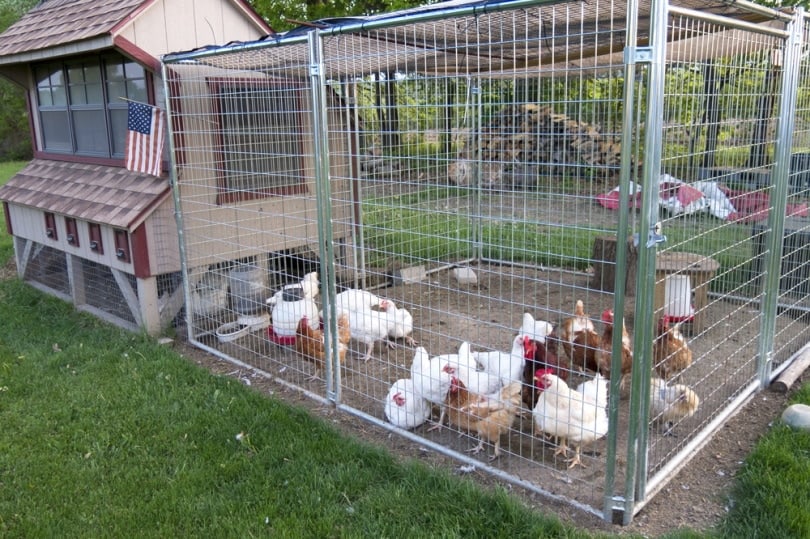Once you get your first flock of chickens, it won’t be long until you become a chicken lady or gentleman. There’s something that takes over once you on your first flock of chicks, making you fall in love with these fantastic barnyard fowl.
Curious, agile, and valuable, chickens bring much personality and utility to our small-scale farms. But if you’ve never owned a flock before, you might wonder about all the supplies required to get started. Here are the essential items you’ll need when owning chickens.

The 10 Essential Chicken Supplies
Feeding
1. Feed
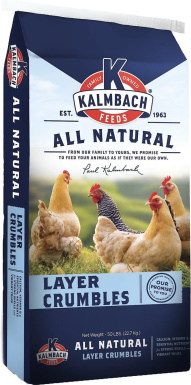
Your chicks will work up an appetite fast! They are master foragers and have voracious appetites to support their growing bodies and feathers.
Medicated vs. Non-medicated Feed
Medicated feed protects your young flock against disease, particularly coccidiosis. Non-medicated feed is simply a crumble of nutrients designed to keep your growing chicks healthy. It is up to you whether you want to start out with medicated feed.
It depends on your chick’s risk of contracting the disease. We want to warn you that you should never feed your chicks a medicated feed if your ducks can get into it. Medicated feed is not agreeable for waterfowl in your barnyard.
Once your chickens get big enough, you can switch them to a dry crumble. If you are raising your birds for meat, you’ll want to get a protein-based feed so they can develop a solid muscle structure.
2. Food and Water Bowls
- Our Choice: Lixit 632 Feeder/Fountain
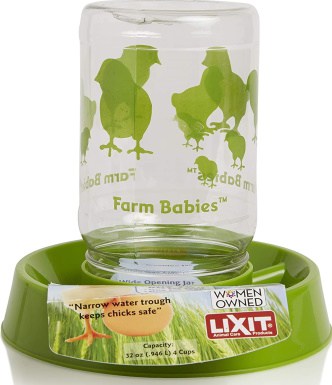
Finding a food and water setup that works for your coop will be tricky. Securing a food and water source is a near must. We know that chickens are messy and knock things over easily.
To avoid any moisture laying in the coop, it’s best to get well-secured bowls and water sources. They make specially designed water bowls for poultry and sell them online and in-store. You can get different sizes, depending on your flock’s needs.

Housing
3. Brooder
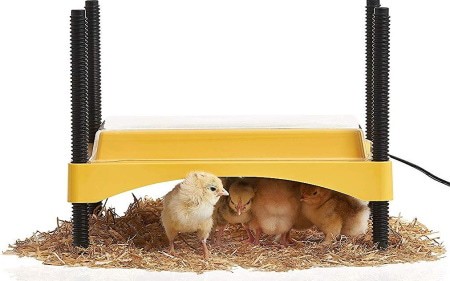
The brooder you choose to keep your chicks in will vary by flock size. If you think you want to start small, having between six to eight chicks, you can likely fit them in a standard commercial bin.
There are many DIY options on the web to make your own brooding areas. This way, you can control the size and safety on your own. However, other arrangements might be better if you want a larger flock.
The bottom line is that you need a brooder to protect your chicks and help them maintain body temperature. So, whether you rely on a premise brooder or your own, it’s an essential part of raising chicks.
4. Heat Lamp
- Our Choice: Woods 0165 Brooder Lamp with Bulb Guard
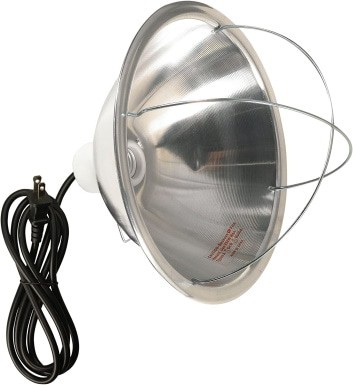
When chickens are born, they can’t retain body heat. They would naturally rely on their mothers for adequate warmth. Since these babies don’t have that option, they need lighting that will mimic mama.
When buying a heating light, it might be best to get a low light option. Since chicks need constant heat, you can’t shut off the lights at night. Getting an infrared light that warms can help promote natural sleep-wake cycles.
When chicks are born, they need a heat source that stays steady. Since they don’t have their mother’s natural body temperatures, they rely on caretakers to do the job and do it well.
Here is a chart to explain the heat cycles for chicks.
| Age | Temperature |
| 0-1 weeks | 90-95 degrees |
| 1-2 weeks | 85-90 degrees |
| 2-3 weeks | 80-85 degrees |
| 3-4 weeks | 75-80 degrees |
| 4-5 weeks | 70-75 degrees |
| 5-6 weeks | 65-70 degrees |
| 6+ weeks | 65 degrees |
After six weeks, your birds are fully feathered and can get by without heat.
5. Thermometer
- Our Choice: Taylor Indoor/Outdoor Thermometer

To accurately track temperatures inside of the enclosure, it’s best to have a thermometer of some kind. There are tons commercially available, and the prices can range tremendously.
So, no matter if you’re on a budget or getting fancy into the hobby, you can find something that meets your needs. Thermometers are readily available at feed stores, some hardware stores, and online.
6. Bedding

Anyone who has ever owned chicks can contest the messiness. It would be best to spot clean bedding every day, and the frequency might increase as they age. Many folks choose straw, but you have other options, too.
Bedding can quickly turn to a pile of mush as frequently as they use it for a toilet. To put it into perspective, they poop around 15 times a day.
You should always keep the coop or brooder clean to prevent an unsanitary mess. It can lead to infections and disease.
7. Coop
- Our Choice: Frisco Wooden Outdoor Chicken Coop
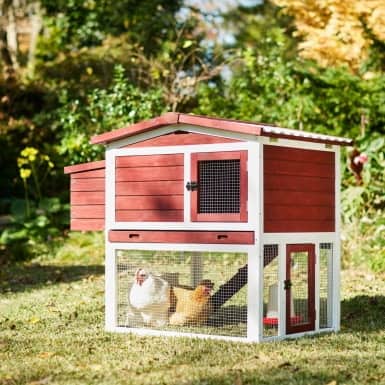
Some days, it might seem like the chick stage will never end. But soon enough, you’ll find yourself letting them out into the great unknown—but not without proper protection.
Your chicks are vulnerable to all sorts of predators. It takes time and effort to ensure your coop is sturdy and capable of protecting your flock.
Also, your chicks need a roosting spot once they start to lay. To provide a space they can do the job, the coop will be their home sweet home. Brooding mothers will thank you especially.
You can make your chicken coop as complex or simple as you want, as long as your chicks have enough space and shelter. There are tons of prefabricated coops to choose from. You can search online or in-store for a setup that works for you. But if you’re a handy person, it might be cheaper to make your own.
8. Nesting Boxes
- Our Choice: Homestead Essentials Poultry Nesting Box
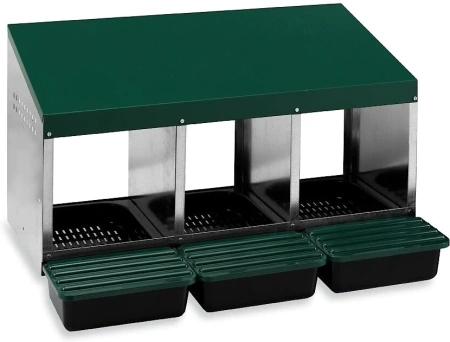
Chickens absolutely require nesting boxes to do their bidding. If they don’t have nesting boxes, it will cause chickens to lay in random areas. If you have free-ranging chickens, they can roost and lay in odd spots.
To avoid this, prepare adequate boxes with excellent nesting material, like straw. Each individual chicken should have their own space, so they don’t feel overcrowded.
It should also be in a convenient enough spot that you can freely access the X to collect. Also, if one of your hands goes broody, she will need a spot to sit where other chickens won’t be bothering her.

Environment
9. Run
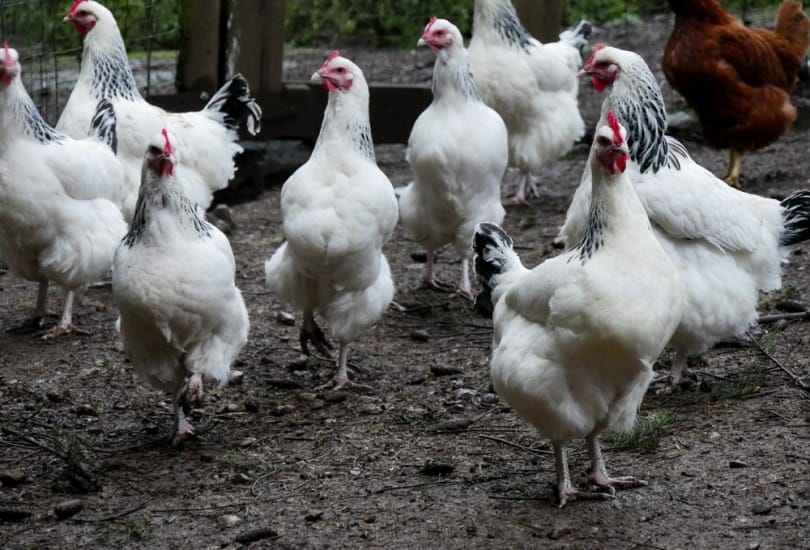
If you choose to have an enclosure for your chickens, they will need a sizable run. Chickens need space to wander and forage. Not everyone chooses a wholly enclosed run, but it is the safest option to keep them from predators.
Even if you let your chickens free-range most of the time, runs are great for rainy days and long stretches where you won’t be home. You can buy a run from a feed shop or hardware store, get an online run, or even make your own!
The size of your run will depend on your flock—or the amount of yard space you have.
10. Scratch
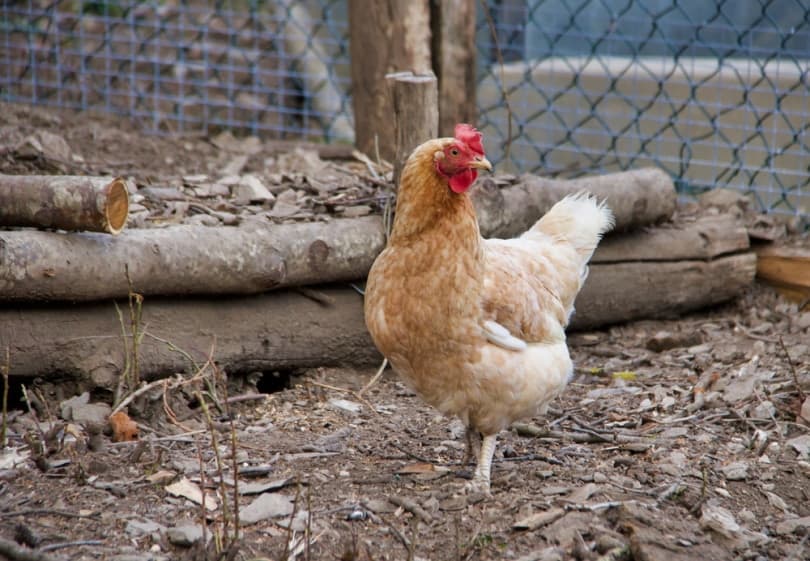
Scratch is an important part of your chicken’s daily life. It encourages your chicken to scrape the ground to find insects and grit. They need these pieces in their digestive tract for optimal health. Scratch should never be confused with a daily diet, as it doesn’t contain the proper nutrients.
Free-ranging chickens can likely get small pieces of stone and gravel in their daily diet. However, if you strictly have your chickens enclosed in a coop, it can be a little harder for them to get natural earth minerals and nutrients.
11. Rooster
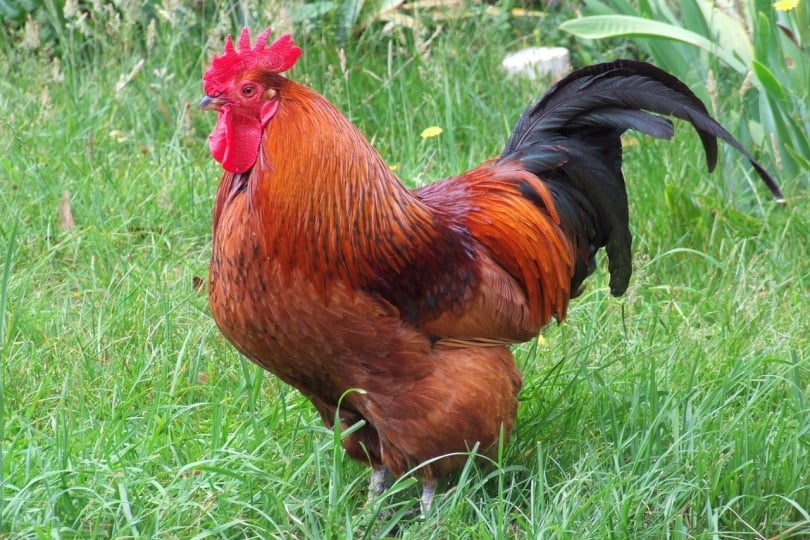
Does this really need pointing out? A rooster is a must-have for a flock. Sure, you might not want to deal with his bad tempers, but he serves as a protector and potential suitor to your hens.
Having a rooster provides a well-rounded flock with a proper hierarchy. When they are free-range, these males can protect your flock from predators. Plus, you can get baby chicks if you choose to incubate or one of your lovely gals goes broody.
However, if you don’t want the hassle of having a rooster, smaller flocks can get by without one.
One downside to having a rooster is the testosterone! Some of them can be beyond frisky and will want to attack. Even if some don’t directly attack, they can be overly aggressive with females, leading to breeding exhaustion.

Conclusion
Getting a flock of chickens is such an exciting endeavor. Once you own your first flock, you’ll likely join the rest of us crazy chicken folk and obsess over your gals. It’s nice to be prepared beforehand to manage the success of your flock.
It might be a little expensive to start, but it doesn’t stay that way. The only thing you’ll really have to do is keep up with coop care and make sure they have plenty of fresh water and grain.
Featured Image Credit: John Panella, Shutterstock
